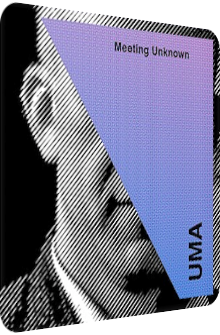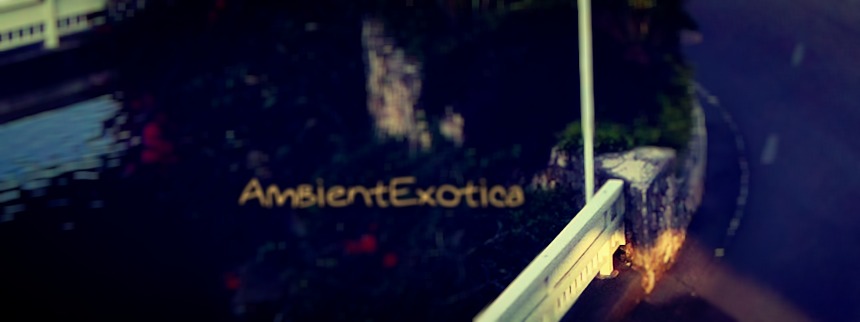
UMA
Meeting Unknown
2012
UMA is the Estonian-Swiss Prog Rock and Ambient project which was recently introduced to me via email by one of its members, Aleksei Saks, who also provided me with a digital version of the album as well as detailed descriptions about UMA. Little did I know about the band’s intriguing conflation of warm melodic guitarscapes in the tradition of Robert Fripp with rather melancholic and at times even slightly intimidating panoramas as presented in film noir works and darker science fiction movies. The trio consists of guitarist and synth expert Robert Jürjendal, percussionist and beat constructor Andi Pupato as well as the aforementioned Aleksei Saks who is mainly responsible for the nostalgic waves due to his use of the piano, a trumpet and a Baroque corno da caccia hunting horn. Meeting Unknown is the second album of the trio, and while the use of trumpets, pianos and guitars might suggest a rather jazzy approach – which is at one point even met –, the band goes all-in on the Ambient front, with decidedly glaring but nonetheless precisely silky injections of the Prog Rock genre. And yet does Meeting Unknown sound anything like a typical Prog Rock album most of the time, for the synthesis of all instruments makes up the nucleus of their respective being. Neither are the horns blasting in a klaxon manner, nor do the guitars screech in sky-high dimensions. The overarching setting is much more laid-back and balmy, with many interwoven stylistic particularities of the Drone genre. Even the melancholia is not melodramatic or crestfallen, but skillfully managed in such a way that it never becomes too dominant. It’s hard to explain, but be assured that the magic of the six tracks derives from the balanced entanglement of all featured ingredients, not their respective counterpoints. With these things in mind, I’m approaching the compositions and lay them out in greater detail below.
The initial point of Meeting Unknown is called Thirst For Light, launching with Andi Pupato’s muffled bass droplets of various tone pitches, followed by the the brazen sun-ripened majesty of Aleksei Saks’ film noir-esque trumpet melody which reaches the listener from atop a mountain and with Robert Jürjendal adding a sizzling-hot but dusky Oriental synth layer that counteracts against the dreamy horn by fueling the tension, this tune is a great introductory artifact. Mystic wind chimes are accentuating the alto flute-like wafts, and it is Iris Oja who boosts the perceived concern and momentousness with her classical voice and glowing chants. Despite the many sound layers, this song feels deliberately hollow, especially so when considering the break beat structure, as it allows the darkness to simmer through every crack of the construction; this purported darkness may be nurtured by the instrumental interplay, but actually comprises of the non-instrumental space and quiescence in the background, insinuating the poignant ebb-and-flow arch as suggested by both the murky and bright elements and of course the song title itself. The darkness outweighs the glinting sparkles, and while I wouldn’t consider Thirst For Light a Dark Ambient piece per se, it is undoubtedly apocalyptic and mournful in its setup. Fans of the 90’s material of Future Sound Of London will be all over it. In stark contrast, the Ambient tune Lenten Month presents somewhat archetypical-kitschy but essentially retro-cyber cowbells from Switzerland whose reverb conflates with the doleful four-to-five-note anacrusis of the trumpet melody which transforms yet again into a wonderful film noir atmosphere. It is the synth streams in tandem with the aqueous guitar twangs in the background which truly elevate this piece to towering dimensions, placing warmth in close proximity to ethereal bliss. The atmosphere is stunningly similar to The Orb’s and Robert Fripp’s FFWD album of 1994, and even though reviewers do tend to overanalyze patterns and draw forceful connections, I believe this reminiscence to be no coincidence, as Robert Jürjendal is a big admirer of Fripp’s work – even the chirping birds at the end do remind of this particular work. With the help of a complementing and heavily filtered space accordion, this composition is anything but a truly awesome work, floating along in a transcendental way with the backing wind breezes. Superb!
Pilgrim’s Sigh is another track which harks back to the darker contrasts of Thirst For Light, but focuses on the dolefulness that is depicted by the piano base frame, several trumpet creeks and a mélange of synth strings. Curiously enough, once a mellow break beat is set against this background, the gravity wanes and turns this tune into an exercise-friendly example of solemnity, keeping its celebratory and insightful ponderousness, but otherwise adding a marker of movement and progression. The following Framed Memories puts the beat-percussion cocktail even more to the foreground after the passing of the first 45 luminescent seconds of a Mediterranean harp string-like mirage. The melody is particularly catchy, with distinctly docile guitar droplets, Saks’ familiar trumpet which is actually blending really well with the guitar, neither imitating a protuberance nor taking over as the lead instrument. The scattered bells and whistles round off the fragility of the track which passes through a key shift in the middle, temporarily residing in minor tone territories. The song ends the way it began, with the entrancing pizzicato cascades intact, making it another great and, at least to my mind, strictly propulsive composition.
The titular track Meeting Unknown (listen to it on UMA’s SoundCloud page) is also close to my heart, as this was actually my first, well, meeting with the soundscapes of UMA. Merging the shawm-like h(a)unting tone sequences of Saks’ Baroque corno da caccia hunting horn with Jürjendals golden-shimmering guitar flow, curiously Sicilian string infusions, the galactic polyphony of synth pulses and clinging triangles, there are no clefts in-between the various layers, as everything flows along gently. Soft wind gusts, Pupato’s laid-back silky beat as well as the skillful wizardry of guest musician Markus Reuter’s touch guitar – itself omnipresent in his recent Centrozoon productions – round off this phantasmagorically oscillating piece. It is set in-between a wave-like mellifluousness and a larger scope when the layers swell and wash over the listener. The guitars work in twofold ways now. On the one hand they resemble a blurred haze that is so often found in the Drone genre, on the other hand there’s a spacey lead guitar whose piercing strings cut through the aural balm. The final, surprisingly jazzy track might have a heart-crushing title, but doesn’t live up to the apprehensions it implies: My Days Are Disappearing Like Smoke might launch with the lugubrious melancholy of warm guitar strings and the final return of the film noir trumpet, but once a warbled crunchy electric guitar and a straight beat set in, the tune shakes off every remnants of its former heaviness and jazziness as it is being transformed to a proper Prog Rock track that evokes more of a jam session than a soothing ambience, the latter of which is resurrected for one last time when the final note of the guitar echoes for several seconds until it fades out into the distance.
The second album of UMA is decidedly less focused on the Prog Rock genre, and yet will fans of King Crimson or Robert Fripp in particular be more than happy with the six dreamscapes the trio comes up with. The percussion might be entirely electronic this time, but it is done on purpose in order to fuel the ambiguously galactic-humble dimensions of Meeting Unknown. The cautious interweaving of spacey guitars, distantly Oriental tone sequences and mellow horns is done with great style, but it is the melodies, the nostalgic film noir feeling which I’ve probably mentioned one too many times plus the earthen scenarios among the wraithlike ambience that altogether make this album very enchanting. The regular appearance of the beats doesn’t distract from the richly texturized panoramas. Nor is the large dose of nostalgia a reason to moan and lament, for it is perfectly balanced; the band somehow manages to encapsulate the listener and giving him or her a place of shelter. There was never one incident where a sound occurred out of place. While we are definitely not in bland Easy Listening territories (this is not the Exotica section), this particular instance might be a problem for sophisticated Ambient afficionados, as the balminess might be a tad too strong; I would have wished for more experimental tone sequences on the electric guitar, even more so since the two final tracks show the possible range. Then again, I’m a sucker for the golden daylight evocation of the Fripp School, and especially Lenten Month and Framed Memories are outright epicurean in this regard, perfectly warm and inviting; an overly aggressive or acidic guitar riff would have destroyed the whole setting. As the album shifts between layers of brightness and darkness, mellowness and liveliness, Oriental and Occidental timbres, the trio of UMA tries their best to mediate between these styles, not to carve them out even more explicitly. Maybe this is the intrinsic secret of the aesthetic success of Meeting Unknown: propitiation. That some listeners may confuse this concept with a whitewashed blandness is a risk UMA must take, and rightly so.
Ambient Review 133: UMA – Meeting Unknown (2012). Originally published on Oct. 10, 2012 at AmbientExotica.com.
